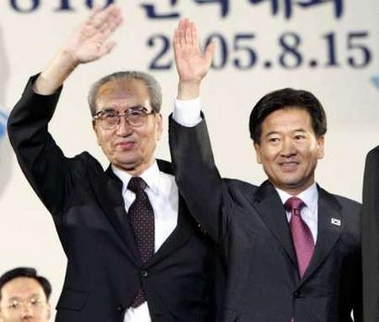|
South Korea sees economic union in Peninsula by 2020
(Reuters)
Updated: 2005-11-16 15:55
North Korea and South Korea are likely to have formed at least an
economic union by 2020, the South's unification minister told Reuters on
Wednesday.
Chung Dong-young also said North Korea would be ready to accept Seoul's offer
of free electricity as a stop-gap until light-water atomic reactors were built
after a deal was reached in six-party talks on Pyongyang's nuclear weapons
programs.
South Korea does not aim for rapid unification, fearful of the German-style
cost of unexpectedly welding together different systems. South Korean ministers
are generally cautious about pinning dates on any form of closer ties.
Yet when asked about a mooted joint North-South bid for the 2020 Summer
Olympics, Chung said that was a good idea and there was likely to be much
progress between now and then.

North Korean chief delegate Kim Ki-nam (L)
waves with South Korean Unification Minister Chung Dong-young before the
opening ceremony to mark the 60th anniversary of the peninsula's
liberation from Japanese colonial rule in Seoul in this August 15, 2005
file photo.[Reuters/file] | "The vision of the Republic of Korea -- my personal vision as a politician --
is that by 2020 we will be a welfare state, and also at the same time, the South
and the North will be able to communicate freely, that we will at least have
developed into a joint economic union," he said.
Chung, who covered the November 1989 fall of the Berlin Wall as a television
journalist, did not elaborate on what form an economic union between Asia's
fourth-largest economy and one of the world's poorest countries might take.
But he said the North appeared headed for an economic opening similar to
China and Vietnam. The North has already begun some piecemeal market reforms.
Noting the Asia-Pacific Economic Cooperation ( APEC) forum was meeting in the
southern city of Pusan, Chung said leaders were likely to declare support for
the six-party talks, which involve the two Koreas, China, Japan, Russia and the
United States. It is likely to be an oral declaration, not a written statement.
"The significance of this, both historically and substantively, is that the
leaders and the people of all the countries in the region, and not just the
countries taking part in the six-party talks, will support peace and stability
on the Korean peninsula and will be doing so right here," he said.
POWER STOP-GAP
The 52-year-old former leader of President Roh Moo-hyun's Uri Party said the
six-way talks were unlikely to resume this year after last week's session ended
with little tangible progress.
"What's clear is it will be held, the second phase of the talks will
definitely take place," he said at his office in the central government compound
near the presidential Blue House many South Koreans assume he aspires to work
in.
He declined to be drawn on his political ambitions, saying his focus for now
was North-South reconciliation.
The North's proposal at the last round was a list of five points covering
such matters as a nuclear test freeze and a halt to transferring fissile
material rather than a step-by-step plan, said Chung, who occasionally broke
into fluent English during an hour-long interview conducted mostly in Korean.
That could prove significant as countries hammer out their positions because
the sequencing and timing of the North's nuclear dismantling in return for aid,
reactors and diplomatic recognition are arguably the toughest part of the
negotiations.
Chung said people should not be too pessimistic about the talks process,
particularly after all sides agreed to a joint statement in September on an
outline aid-for-disarmament plan. But he indicated he thought an early deal was
unlikely.
"I think there is a view to underestimate the fifth round of the six-party
talks in Beijing," he said.
"But if you take the process of dismantling the North's nuclear programs as a
long one that will take at least three years or longer, I think it is
significant there was an agreement on basic principles."
Chung said it could take a decade or more to reach a deal and then build the
nuclear reactors the North wants in return for ditching its nuclear weapons
programs.
"They are saying it would be a good idea if the South would tentatively
provide electricity during that period," he said, referring to what the North
has said about the South's offer to donate 2,000 megawatts in return for atomic
disarmament.
|